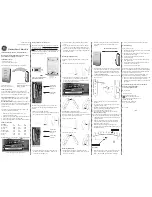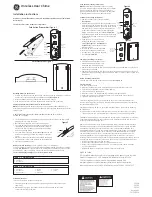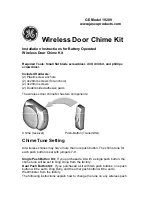
36
may e. g. be pulled back briefly by actuating
the doorknob.
Lock box
Electromechanical component of a door fitting,
which - with the aid of a coupling mechanism -
only transmits the movement of the door
handle to the square spindle if a valid booking
has been made at the fitting beforehand.
Locking lever
A rotating control element for the keyless
manual actuation of the bolt. Normally used
inside of a room, e.g. in bathrooms, WCs and
hotel rooms. Synonyms: Turning bolt, bolt olive
(for window attachments: window olive).
Locking plate
A steel plate mounted at the locking height
with openings for the latch/bolt. The latch/bolt
engages with the openings and thus keeps the
door leaf locked/bolted. In steel doorframes,
the required openings are often already
integrated; the locking plate is then obsolete.
NetworkOnCard
The term NetworkOnCard comes from the
sector standalone terminals / electronic locks
(such as PegaSys, IF 131). For persons who
carry out their bookings at these
terminals/electronic locks, the booking
permissions are loaded to the credential and
evaluated by the mentioned devices during the
booking procedure. Instead of sending the
permissions from the host system "per
network" to the devices as with online
terminals, the persons carry their permissions
on their credential.
Permanently open mode
In conjunction with NetworkOnCard devices,
this term describes the switch between the
operating modes "released" (also called
"permanently open") and "not released".
Application example: The first person that
enters a room toggles the NetworkOnCard
component to the "released" (permanently
open) mode by making a booking. Thereafter,
the door can be opened without making a
booking. When the last person with
authorization to activate the permanently open
mode leaves the room, the NetworkOnCard
device toggles back to the "not released"
mode. Now the door can only be opened by
means of a positive booking.
The toggle can also be time-controlled.
Plate
A door lock cover plate on the door leaf.
Contains e. g. openings for doorknobs and
locking cylinders.
Release (door)
When a door is released,, the door handle and
the lock mechanism are electromechanically
connected.
Released (state)
In the released state, the actuating element
(e.g. door handle, knob, turning bolt or locking
lever) is electromechanically coupled, i.e. you
can actuate the blocking element.
Opposite: Blocked.
RFID credential
"RFID credential" (or the shortened form
"credential") is the general term for media such
as RFID identification cards or RFID key tags.
RFID credentials frequently contain personal
identification properties. An RFID-compatible
device can contactlessly read data from RFID
credentials across short distances, using
electromagnetic waves, and can optionally
also write data to the credentials.
Security function
In a lock, the "security function" means that the
latch bolt can be retracted from the outside of
the door by means of the "key". This function is
e.g. important if no door handle is used on the
outside of the door, but instead a rigid knob.
The latch actuation function thus switches from
the door handle to the key.
Square spindle
Coupling element (e. g. square pin) between
the external doorknob and the internal lock
mechanism. In its built-in state, the square
spindle cannot be seen from the outside.
Tubular frame door / profile door
A profile door, also called tubular frame door,
is made of metal or plastic profiles (usually
rectangular tubes with a special shape in the
cross-section). The profiles form a frame into
which a door body (glass, plastic, metal) is
inserted. There are special locks and fittings
for these doors.

































